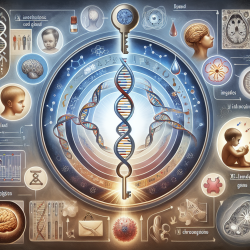Autism Spectrum Disorder (ASD) presents a complex landscape for researchers and practitioners alike. With its intricate interplay of genetic and environmental factors, understanding ASD requires innovative approaches. A recent study titled "Cord blood DNA methylome in newborns later diagnosed with autism spectrum disorder reflects early dysregulation of neurodevelopmental and X-linked genes" provides a fresh perspective on early detection and intervention strategies for ASD.
The Promise of Cord Blood DNA Methylation
The study explores the potential of using DNA methylation patterns found in umbilical cord blood as biomarkers for ASD. By examining the epigenetic signatures present at birth, researchers identified distinct patterns that differentiate newborns who later develop ASD from those who do not. This groundbreaking approach offers a window into the earliest stages of neurodevelopmental dysregulation associated with ASD.
Key Findings and Implications
- Sex-Specific Differences: The study revealed differential methylation regions (DMRs) that vary between males and females, highlighting the importance of considering sex differences in ASD research.
- X-Linked Gene Involvement: A significant finding was the enrichment of DMRs on the X chromosome, which may contribute to the higher prevalence of ASD in males compared to females.
- Early Diagnosis Potential: Identifying these epigenetic markers at birth opens avenues for earlier diagnosis and intervention, potentially improving outcomes for children at risk of developing ASD.
Practical Applications for Practitioners
As a practitioner, integrating these insights into your practice can enhance your ability to support families affected by ASD. Consider the following actions:
- Stay Informed: Keep abreast of developments in epigenetic research related to ASD by attending conferences and webinars.
- Collaborate with Researchers: Engage with researchers conducting similar studies to explore potential partnerships or collaborative projects.
- Advocate for Early Screening: Encourage early screening programs that incorporate epigenetic markers to identify children at risk for ASD sooner.
Encouraging Further Research
This study underscores the need for continued research into the epigenetic mechanisms underlying ASD. By supporting further investigation, we can deepen our understanding of how genetic and environmental factors converge to influence neurodevelopment. Practitioners can play a vital role by participating in research studies or facilitating access to patient data where appropriate.
The potential to transform ASD diagnosis and treatment through epigenetic insights is immense. By embracing these findings and encouraging further exploration, practitioners can contribute to a future where early intervention is not just possible but routine.
To read the original research paper, please follow this link: Cord blood DNA methylome in newborns later diagnosed with autism spectrum disorder reflects early dysregulation of neurodevelopmental and X-linked genes.










